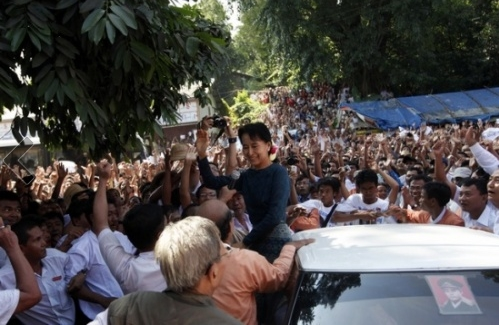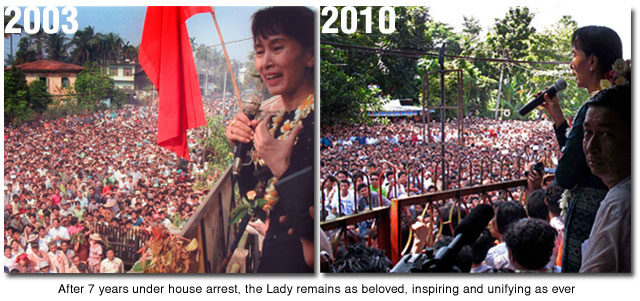Daw Aung San Suu Kyi’s Long Awaited Release Brings Unity and Hope
By Burma Partnership • November 15, 2010 Daw Aung San Suu Kyi’s emergence from house arrest following the expiration of her wrongful detention sentence has caused a ripple effect across Burma’s political scene. Unable to keep the democracy leader under detention any longer according to their own laws, the regime’s inability to manipulate the political environment in this situation has brought about a greater potential for political change that their fraudulent elections ever did.
Daw Aung San Suu Kyi’s emergence from house arrest following the expiration of her wrongful detention sentence has caused a ripple effect across Burma’s political scene. Unable to keep the democracy leader under detention any longer according to their own laws, the regime’s inability to manipulate the political environment in this situation has brought about a greater potential for political change that their fraudulent elections ever did.
Speaking to a crowd of 40,000 supporters, Daw Aung San Suu Kyi pledged her commitment to the people, national reconciliation, and the rule of law.
(credit: Democratic Voice of Burma)
Her speech was met with applause and tears around the country; indeed, the National League for Democracy (NLD) leader’s release six days after the elections has already produced a type of unity that was absent amongst all the political players during the months leading up to the elections. Leading democracy and ethnic parties who had participated in last week’s elections have already pledged their support for the Lady. Daw Aung San Suu Kyi’s ability to gain dedication and loyalty from both those who had boycotted and participated in the elections highlights her remarkable gift for unifying and inspiring the whole country.
Scores of political parties from last week’s elections have recently pledged their support for the democracy leader.
U Tin Maung Aye, Vice-President 1 of the Difference and Peace Party (DPP) declared, “Daw Aung San Suu Kyi is an essential national leader to bring democratic changes to the country. Thus, it is the very time for democratic forces to unite behind her for a dialogue… we’ve seen that people waited for the release of Daw Aung San Suu Kyi in disciplined manner, which means people follow the national leader of their choice.”
U Thu Wai, the Chairperson of Democratic Party (Myanmar) said, “The release from house arrest is very good. She can work a lot for the people and the country, and her party. That’s very good. We will work together on many issues. We also sent our message to her stating we hope she can work effectively for the people and the country
Dr. Aye Maung, the Chairperson of Rakhine Nationals Development Party (RNDP), said, “[Daw Aung San Suu Kyi] was under detention for a long time so people of Burma lost opportunities to participate in her effort to bring democratic change to the country. Now Daw Suu is 65 but we really hope that new generations work with her and we really hope and rely on her to bring democratic change to the country we all love.”
U Bo Maung, leader of United Democratic Party (UDP), reiterated the sense of hope and optimism surrounding Daw Aung San Suu Kyi’s release. “We are so happy,” he said, “I assume that’s a new step for democracy in Burma.”
Daw Aung San Suu Kyi has, most importantly, received the support of a vast number of ethnic political representatives; such support is particularly significant in Burma where achieving the trust and support of ethnic communities is crucial for national reconciliation and peace.
Both the Chin Progressive Party (CPP) and Chin National Party (CNP) warmly welcomed Daw Aung San Suu Kyi’s release; U Shein Tun, the General Secretary 2 of CPP stated, “We recognize her as the leader of democratic forces. We have plans to work with her. We admire her for her attitude and strong mind, and she is the daughter of the independence leader.” Kyae O Beak Thaung, the General Secretary of CNP emphasized Daw Aung San Suu Kyi’s leading role in national reconciliation and resolving issues of ethnic equality, stating, “We hope to meet with Daw Suu as her father triumphantly discussed with ethnic leaders in Panglong.”
U Sai Sau Si, Vice-Chairperson of Shan Nationalities Democratic Party (SNDP) stated that SNDP was happy for Daw Aung San Suu Kyi’s release and reiterated their common goal in working for the people.
Other ethnic leaders declared their hope for Daw Aung San Suu Kyi to lead a second Panglong Conference to discuss issues of ethnic equality within the framework of the recent Kalay Declaration.
Nai Ngwe Thein, Chairperson of All Mon Regions Democracy Party (AMRDP) stated, “We call for a second Panglong Conference under the leadership of Daw Aung San Suu Kyi. We will mainly focus on the recently released Kalay Declaration for the discussion.”
Political parties further declared that their commitment to meeting Daw Aung San Suu Kyi was greater than their fear of disbandment.
Khin Maung Swe, the leader of National Democratic Force (NDF), the political party that split from the NLD to contest in the elections, reiterated their allegiance to the democracy leader. “We are ready to meet with Daw Aung San Suu Kyi if she accepts the meeting,” he said. “She’s our leader. I don’t care about disbanding of the party for meeting our leader. When we meet her, we will explain to her about why we need to establish the party, and how we’ve been working for people.”
Khin Maung Swe further outlined her importance to all of the people of Burma, “We see her not only as the head of the NLD, but also the democracy leader for 59 million people.”
Moreover, various leaders of ethnic ceasefire armies declared their full support for Daw Aung San Suu Kyi to lead the movement towards national reconciliation.
Nai Han Tha, secretary of the New Mon State Party (NMSP), noted,
[Daw Aung San Suu Kyi] has many capabilities, skills and qualities for the national reconciliation. Moreover, there are many people so ready to follow her lead and she has international support. So, we truly believe that her leadership will be very effective… For Daw Aung San Suu Kyi, when she leads, all people and other forces will follow her lead, and the international community will support her. So, the national reconciliation process will be very much effective. The ruling group cannot ignore that anymore, they cannot stand against her anymore. I do believe that the national reconciliation process will definitely be triumphant
Dr. Tuja, the leader of the Kachin State Progressive Party (KSPP), a political party rejected by the Election Commission for its links to the Kachin Independence Organization (KIO), stated boldly: “I believe that when Daw Aung San Suu Kyi is released, by engaging an inclusive dialogue with all stakeholders: the military government, all ethnic groups and all democratic forces, with fraternity, there will be an answer for the problems.”
Such rallying support from a vast array of democracy and ethnic political parties highlights Daw Aung San Suu Kyi’s continued significance as a political leader in Burma. While her release by no means absolves the regime from wrongfully detaining the democracy leader to begin with, the military regime may have unintentionally catalyzed the movement towards genuine political change and ethnic equality. While the elections completely failed to open up the necessary space to move towards democracy and peace to Burma, Daw Aung San Suu Kyi’s presence in the political arena undoubtedly will.

This post is in: Blog
Related PostsForeign Secretary meets Aung San Suu Kyi in London
The Elders welcome Myanmar peace conference
Burma: US Should Retain Key Sanctions
Advisory Commission on Rakhine State – A Welcome Investigation into Arakan State’s Human Rights and Humanitarian Crisis
Statement of ARNO on Daw Aung San Suu Kyi’s 21st Century Panglong Convention









 All posts
All posts